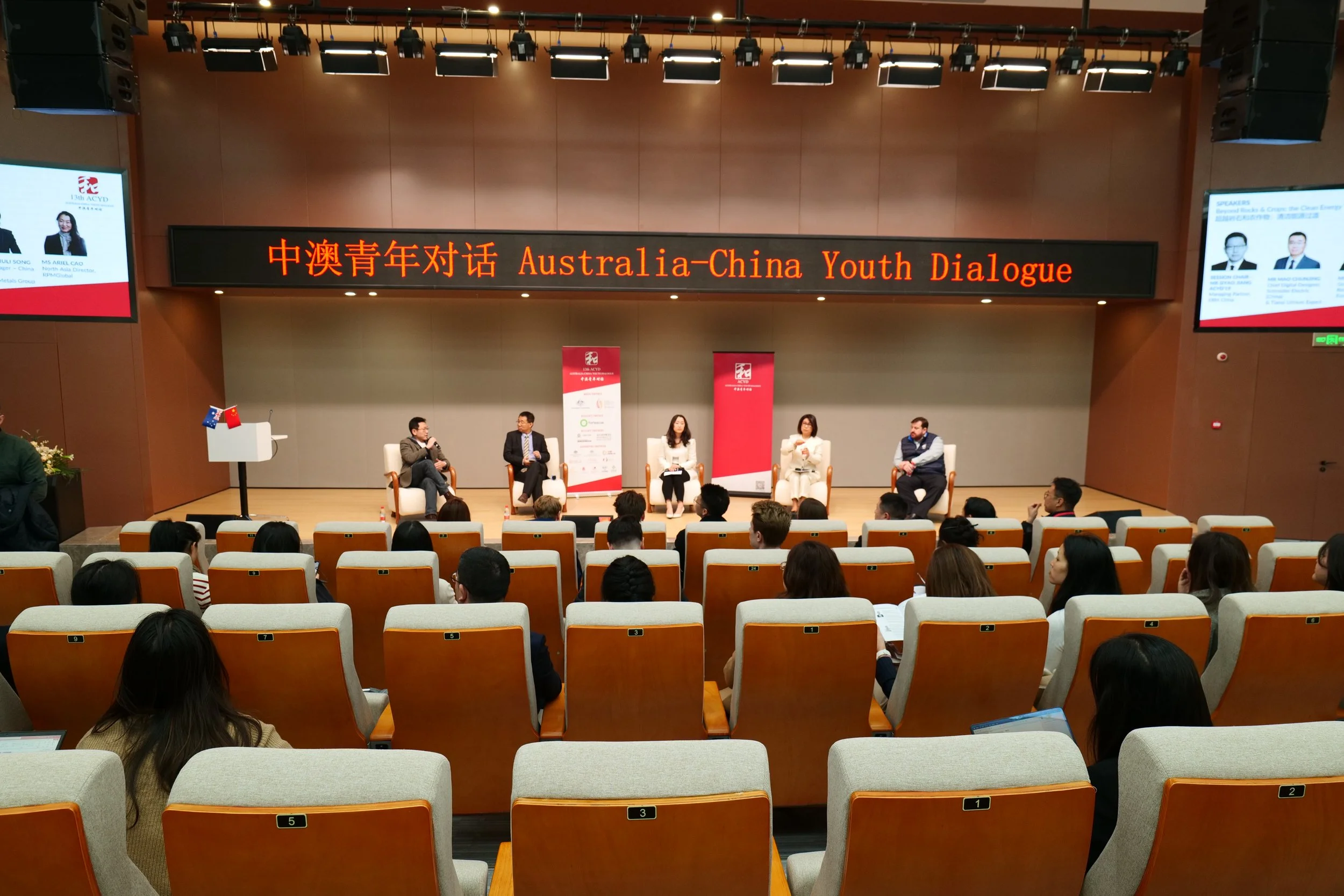As director of luxury retail at Savills, one of the world’s largest real estate firms, Beijing-based Timothy Coghlan connects Chinese landlords and international fashion brands to help broker deals for new retail stores in the world’s largest luxury market.
Application to ACYD 2014 is now closed
ACYD Past and Present Organisers Event in Hong Kong
Past ACYD organisers Chris Kong, Will McCallum, Dom Meagher, Hayley Ward and Henry Makeham meet with DFAT representatives in HK.
SAVE THE DATE – ACYD SICHUAN ‘WINTER WARMER’ DINNER
Please save the date 26th June. We will be having a ‘Winter Sichaun Warmer Dinner’ at Red Chilli Restaurant in Chinatown starting at 7pm. As we mentioned guests are welcome to join – however please let me know whether you are bringing guests, and if so, how many people are coming so I can add to our booking. PLEASE RSVP TO ME BY 24 JUNE. At this stage we will do ala’ carte and split the bill, but if the guest list grows we may pre-order. The restaurant is BYO licensed corkage is 3$ per head.
Restaurant details: http://www.redchilligroup.com.au/Default.aspx?location=Chinatown
Youth dialogue brings a new age in China-Australia ties
Xinhua, October 7, 2013
As Australia's new prime minister meets China's President Xi Jinping on the sidelines of the APEC summit, a grassroots movement intent on seeking deeper understanding between Australian and Chinese youth is winding down after a landmark event in Canberra and Melbourne between Sept. 24 to 29.
Launched only a few years ago, the Australia-China Youth Dialogue (ACYD) saw leading early career Australians and Chinese gather in record numbers to benefit from the rare opportunity of engaging one-on-one with key players from government and industry, across both nations, and in the words of one delegate - distil the shared optimism of the youth of both nations.
"The Australia-China Youth Dialogue is Australia's premier track two early career leaders forum between Australia and China, and in its fourth year brought together 15 Australians and 15 Chinese passionate about advancing the Australia-China relationship," said Fiona Lawrie, ACYD's executive director.
The governor general of Australia set the tone for the dialogue, with an opening reception at the Government House in Canberra. Kim Beazley, Australian ambassador to the United States, Professor The Hon Gareth Evans AC QC, Secretary to the Department of Foreign Affairs and Trade Dennis Richardson AO, and Acting Secretary to the Department of Foreign Affairs and Trade Gillian Bird are just some of the names that led opening addresses, panel discussions and keynote speeches for delegates to engage in lively discussion on Australia's economic, security, trade and cultural relationship with China.
According to founder and chair of the ACYD Board, Henry Makeham, the ACYD builds frequent and meaningful engagement between young adults in China and Australia who share the common goal of furthering Australia-China relations.
Makeham told Xinhua that one of the key functions of the dialogue was access.
"Young professionals are often the most optimistic, energetic and dynamic actors within bilateral relations, but they're voices and ideas all too often come last when business and government interests are so intense," he said.
"The dialogue gives leaders a platform and youth a voice. Engagement and access is everything when we talk about how to bring the best out of young. We give the relationship the knowledge now, to bring confidence to the leaders of the future."
Makeham, who has himself been a keen student of China- Australian relations, was originally inspired to fill the void while pouring over a 2009 article by Australia's first ambassador to China Stephen Fitzgerald.
Fitzgerald has been a vocal advocate for a more institutionalized dialogue between Australia and China through both governmental and non-governmental organizations.
Makeham wanted to enhance Sino-Australian relations by bringing together key people from both sides to forge deeper connections for the future.
Gathering his own team of like-minded and innovative youth from a range of backgrounds, Makeham founded the ACYD, as the charter says, "to promote a more sophisticated cross-cultural understanding among Australian and Chinese youth."
Or in his own words, "to cut through the media-hype, the geo- politicking, the economic fireworks," and get down to " facilitating a genuine understanding of Chinese and Australian culture and society by seeking out and encouraging the future leaders to take a an active role in Australia-China relations."
According to Lawrie, "these delegates will one day be responsible for the ongoing development of the bilateral relationship."
"We have selected these delegates from hundreds of applicants," said Lawrie. "They represent a range of backgrounds: Start up entrepreneurs, hedge fund analysts, graduate school candidates, high level political analysts, fashion experts and scientists to name just a few."
Former Australian ambassador to China Richard Woolcott, says the Australia-China Youth Dialogue has become more than an institution, more than just a forum for ideas.
"The (Australia-China Youth Dialogue) is probably in many ways more important because it's really for a new generation of forward looking young men and women to work for a more stable and peaceful and economically developing Asia-Pacific region." Endi
Retrieved from http://www.china.org.cn/world/Off_the_Wire/2013-10/07/content_30215968.htm
Youth Engagement - The Australia-China Youth Dialogue
06 November 2013 by Joel Wing-Lun The 2013 Australia-China Youth Dialogue (ACYD) took place on September 24 with a reception hosted at Government House with a reception by the Governor General, the Hon Quentin Bryce AC CVO. ACYD 2013 brought together 30 Australian and Chinese young leaders with diverse backgrounds and expertise in Canberra and Melbourne for a six-day dialogue exploring issues and trends affecting the Sino-Australian relationship.
Prof the Hon Gareth Evans AC QC, Chancellor of the Australian National University and former Foreign Minister of Australia, Mr Peter Varghese AO, Secretary of the Department of Foreign Affairs and Trade, and Prof Kerry Brown, Executive Director of the University of Sydney’s China Studies Centre (CSC), were among the eminent individuals who addressed this year’s Dialogue.
The Australia-China Youth Dialogue was proud to partner with the University of Sydney’s China Studies Centre. In announcing the partnership, Prof Kerry Brown praised the ACYD: “Engaging young professionals and academics in China in their work and their lives is critically important, and building deeper links between the two countries is something we fully support and wish to see flourish.”
The CSC supported a University of Sydney alumni fellow to attend ACYD 2013. The Centre is also a partner of the 2013 ACYA Journal of Australia-China Affairs.
ACYD
In 2009, Dr. Stephen Fitzgerald (Australia’s first ambassador to the People’s Republic of China, 1973-76) highlighted the absence of – and a need for – more institutionalised dialogue between Australia and China through both governmental and non-governmental organisations. In 2012, the Hon. Julia Gillard MP, Prime Minister of Australia, stated that “In the Asian century, business as usual is not enough”.
ACYD was founded to address these concerns, and promote frequent and meaningful engagement and more sophisticated cross-cultural understanding among Australian and Chinese youth. Since 2010, ACYD has brought young leaders from Australia and China together with key experts and decision makers to discuss key aspects of the bilateral relationship.
Speakers at past Diaologues have included HE Ms Frances Adamson, Australian Ambassador to the People’s Republic of China, Justin Yifu Lin, former Chief Economist and Senior Vice President of the World Bank, and the Hon. Bob Hawke AC, former Prime Minister of Australia.
Objectives
ACYD seeks to enhance Sino-Australian relations by forging lasting connections that will benefit both countries in the future. The main objectives of the ACYD are to:
- Facilitate an understanding of Chinese and Australian culture and society;
- Encourage talented youth to take an active interest in Australia-China relations;
- Bring together Australian and Chinese youth from different sectors to create long-term, mutually beneficial relationships; and
- Encourage youth to seek employment opportunities in future business, research, NGO and/or diplomatic roles between Australia and China.
With the respected former Australian diplomat Richard Woolcott AC recently describing the ACYD as “probably more important than the Australian American Leadership Dialogue,” it is safe to say that the ACYD is well on the way to achieving these aims.
Retrieved from http://www.chinastudiescentre.com.au/youth-engagement/the-australia-china-youth-dialogue/
Our Voice - The Australia-China Youth Dialogue
25 September 2013 The premier bilateral conference for young Australian and Chinese leaders, the Australia-China Youth Dialogue, kicks of this week, and international student Lina Tao from the Faculty of Arts and Social Sciences is one of 30 delegates selected to participate.
Tao will also attend as one of only two Foundation for Australian Studies in China Fellows. This year, the conference will focus on Australia’s political, economic, cultural and security relationship with China.
The four-day conference will feature keynote addresses from high-level ASEAN, Defence Department and DFAT representatives, as well as former Victorian Premier and Independent Director of Huawei Technologies, John Brumby. Delegates will also have the opportunity to visit the ABC offices and learn about its China engagement strategies.
This is of particular interest to Tao, whose Masters project is focusing on how the Chinese media represents migrant children in the country.
“It’s an examination of how both traditional and new media represent the millions of child migrants in China. They are often represented as a minority, and there has been a very specific ideology underpinning the discourse relating to them,” she says.
For Tao, the motivation to undertake this particular area of research comes from her personal experience of moving from rural China to Beijing so she could complete a Bachelor of Communication Studies at Peking University.
She is now looking forward to discussing with delegates how Australia engages with China on the key issues of governance, politics, economics and the changing media landscape.
“The two countries have different frames of reference and different ways of thinking,” says Tao.
“It’s more than just language and cultural barriers. We have to discuss what the ideology is behind each country’s approach to their bilateral relations.”
The Australia-China Youth Dialogue is taking place in Canberra and Melbourne, 25-29 September.
Media contact: Cassie Chorn, UNSW Media Office, 9385 8107
Retrieved from https://newsroom.unsw.edu.au/news/students/our-voice-australia-china-youth-dialogue
Confirmed Speakers for ACYD 2014
The 2014 Dialogue will welcome a diverse range of experts who have a unique perspective on the Australia-China relationship, including the following confirmed speakers:

HE Ms Frances Adamson Australian Ambassador to the People’s Republic of China
Ms Adamson arrived in Beijing on 8 August 2011, and presented her Credentials to the President of the People’s Republic of China, HE Mr Hu Jintao, on 16 August 2011.
Ms Adamson served in the Australian Consulate-General in Hong Kong in the late 1980s during the early years of China’s reform and opening, and first visited mainland China in 1987. She was seconded as Representative to the Australian Commerce and Industry Office in Taipei from 2001 to 2005.
She has twice served in the Australian High Commission in London, including as Deputy High Commissioner from 2005-2008 and as Political Counsellor from 1993 to 1997. She was Chief of Staff to the Minister for Foreign Affairs and then the Minister for Defence from 2009 to 2010.
Ms Adamson is an honorary patron of the China-Australia Chamber of Commerce in Beijing, patron of the Australia China Alumni Association, a member of the Advisory Board of the Australian National University’s Australian Centre on China in the World and a member of the national Board of the Australia China Business Council.
She is married with four children and speaks Mandarin.

Chen Lei News Anchor
Ms Cheng Lei is an anchor for the “BizAsia” and "BizTalk" shows on CCTV-News.
Prior to rejoining CCTV in 2013, Lei was the China Correspondent for CNBC for nine years, based in Shanghai and Singapore.
Lei’s list of achievements includes reporting on key events throughout China’s economic rise, such as Beijing’s 2008 Olympics and Shanghai’s 2010 World Expo, China-US trade relations.
Lei has interviewed an impressive array of political and business leaders, including Bill Gates, EU president Jose Manuel Barosso, then US treasurer John Snow, Rodrigo Rato (Managing Director of the IMF), and over 100 CEOs of Fortune 500 companies.
Lei’s career in journalism began in Beijing at CCTV's English channel in 2003. She also spent a year in Shandong province on a sinoAustralian logistics joint venture – her first job since returning from Australia.
Having started out in finance, Lei worked for five years with Cadbury Schweppes and ExxonMobil in Melbourne. She is a Certified Practising Accountant. Lei obtained her Bachelor of Commerce degree from the University of Queensland, Australia.
Ms Cheng is also an accredited translator between Chinese and English. Lei was born in China but became an Australian citizen.

Timothy Y. Chen President, Telstra International
Timothy Y. (Tim) Chen, 58, was appointed President of Telstra International effective 5 November 2012. He holds offices in Hong Kong and Beijing.
Tim is an internationally recognised technology executive with a track record of success in major global firms in China and the United States. A member of Telstra CEO Leadership Team, Tim reports to Telstra Corporation CEO, Mr David Thodey. Born and raised in Taiwan, Mr Chen is the first Chinese person to hold a CEO Leadership Team position at Telstra.
Tim joined Telstra as a member of the Board of Directors in March 2012, having been identified for his technology, strategic and business experience working with private and public sector organizations in China over 20 years.
He was previously a Beijing-based partner with international private equity firm GL Capital Group. Before this he held senior executive roles for international firms including Microsoft, Motorola and AT&T Bell Laboratories.
He was CEO for National Basketball Association China from 2007 to 2010, including management of all television and digital media partnerships; Corporate Vice President of Microsoft and regional CEO from 2003 to 2007; Corporate Vice President for Motorola and Chairman and President of Motorola (China) Electronics from 2001 to 2003 and CEO of Hong Kong listed company 21CN Cybernet from 2000 to 2001.
Prior to 2000, Mr Chen spent eight years in China with Motorola, including serving as general manager responsible for sales and marketing for the Greater China Cellular Infrastructure Division. Mr Chen also spent nine years at AT&T Bell Laboratories in the United States.
He holds a Masters of Business Administration from the University of Chicago and Masters degrees in both Computer Science and Mathematics from Ohio State University.

Nathaniel Davis Co-Founder & Operations Director, Split Works
A China veteran of 16 years, Nathaniel stumbled into the music industry in 2001 via organizing a series of benefit concerts for UNICEF. He booked his first Grammy Award-winning artist, kd lang, in 2002 in Shanghai. Split Works is the second company in China which Nathaniel has partnered in founding. The first was a Beijing-based event production and technical services company, which production and tour managed China gigs for acts such as Norah Jones, Alicia Keys and Chinese rocker Zheng Jun (郑钧 ) and managed the Chivas “Top 10 DJ” project with China tours for DJs such as Tiesto and Deep Dish.
Previous to entering the music industry, Nathaniel was involved with managing charitable causes for a leading Hong Kong entrepreneur and philanthropist, where he developed his extensive contacts and honed his experience within Chinese government and social circles.
Split Works was founded in mid-2006 by Nathaniel and partner Archie Hamilton with the intention of bringing good international music to China and trying to help the domestic live music scene. Since then, Split Works have promoted hundreds of shows across China and started several festivals, including the JUE | Music + Art festival and Black Rabbit Music Festival. Among the acts that Split Works have promoted include Sonic Youth, Death Cab for Cutie, The Lumineers, St. Vincent, Andrew Bird, Jose Gonzalez, Ludacris, 30 Seconds to Mars, Caribou, Faithless, Hebe, Khalil Fong, Qu Wanting and many many more.

Tim Dillon Commissioner for Victoria to China, State Government of Victoria
Tim Dillon took up his appointment as the Commissioner for Victoria in China in September 2014. Based in Shanghai, Tim represents Victoria’s interests in China, Hong Kong and Taiwan and manages, in addition to Shanghai, Victorian Government Business Offices (VGBOs) located in Hong Kong, Beijing, Nanjing and Chengdu. Tim represents Victoria’s interests in the region, facilitating trade and investment opportunities and strengthening bi-lateral relations. Tim also develops and maintains high level government to government linkages and facilitates strategic collaboration between Victorian and South East China.
Tim has extensive experience representing Victoria in Asia having spent more than 10 years living and working in Asia and has a thorough understanding of the complexities of doing business in one of the world’s most economically and culturally diverse regions. Prior to his appointment to China, Tim served as the Commissioner for Victoria in South East Asia (2009-2014) and the Executive Director of the Tokyo VGBO (2004-2009) with responsibility for Korea, where he facilitated Victorian exports to North East Asia and productive foreign direct investment into Victoria. Tim also managed relationships with key investors across a range of industries including food and beverage, automotive, ICT, energy and biotechnology.
Having dealt with hundreds of companies across a range of industries and in multiple countries, Tim has extensive trade development and investment facilitation capabilities. Tim facilitated significant investment into Victoria’s renewable energy sector and played a lead role in facilitating the establishment of a new automotive technical manufacturing centre based in Melbourne. Tim also facilitated the successful entry of a number of Japanese food and beverage processing companies in to the Victorian market.
He has worked in both the private and public sectors and has undertaken formal studies in Economics, Japanese and Asian Studies.

Kathy Gong Founder Sichuan Seeway Machinary Company Limited, Founder KG Inc
Ms Kathy Gong took over the family business as a young CEO in 2008 and tripled the company’s annual output value which propelled it to a leading position in the construction industry in Sichuan for three consecutive years. Later in 2010, she founded Sichuan Seeway Machinery Company, Ltd. which became one of the leading private construction machinery rental companies in Sichuan, China.
Prior to her family business succession, Kathy was the youngest national chess champion at the age of 10 in 1996 and again at 12 in 1998. She is one of the youngest chess master in China.
In 2011, Seeway Investment was founded to bridge the business relations between Chinese and International stakeholders, focusing on investment management, trading and consultancy, the company aims to build a trusted economy offering innovative portfolios with distinctive Asian themes to investors worldwide and be the strategic partner of choice to its clients.
Kathy is Member of the Chinese People’s Political Consultative Conference (CPPCC) in Chengdu; Deputy Executive Director of the Chengdu Commerce and Industry Committee; Member of the Foundation Board of Global Shapers Community World Economic Forum; Image Ambassador of Chengdu’s Young Entrepreneurs; and Anchorwoman at a weekly business talk show at Chengdu TV station. She was elected as one of the Top Ten Entrepreneur Representatives of China’s Economic Innovation in 2011.
In 2013 Kathy founded KG Inc, an exclusive business event management company, the organizer of APEC Women Leadership Forum, a business event complementary to the APEC’s business goals and policy recommendations on women & the economy to APEC member economies focusing on improving women’s access to finance, access to international markets, capacity and skill building, and women’s leadership in a turbulent and dynamic world where she also serves as a Co-Chair to the APEC Women Leadership Forum.
Kathy holds a B.A. (Dean’s List) degree in Economics, and East Asian Languages and Cultures from Columbia University.

Robert Hsiung Chief Operating Officer sharewithu.com
Robert Hsiung is a serial entrepreneur with a background in strategy consulting, that has passion for building new businesses and high-performance teams.
As a strategy consultant at Monitor Group, Robert worked in over 15 different countries and 18 different industries across the world. Thereafter, he earned a MBA at the Stanford Graduate School of Business in 2008 and returned to Beijing to begin his entrepreneurial journey. Robert sold his first startup, a location-based mobile Linkedin-like app, to French professional-networking company, Viadeo in 2012. In 2013, Robert helped Sequoia backed YaoYaoZhaoChe, a taxi-calling app, turnaround the business raise a new round of financing.
Robert is currently the COO of Sharewithu.com, China’s largest online study-abroad portal. Over 80% of outbound study abroad students in China use Sharewithu’s free content and services to prepare for TOEFL, IELTS, GRE, and GMAT tests, to get advice on school selection, and help with preparing their applications.
Robert completed his undergraduate degree in Computer Science and Management at the University of Pennsylvania.

Lauren Johnston Lecturer, Beijing Foreign Studies University
Lauren Johnston was raised in Victoria, and lectures Modern Chinese Economy at Beijing Foreign Studies University. Concurrently Lauren freelances for the Economist Intelligence Unit and is retained as a China adviser to a large China-Australia joint venture.
Completing her PhD in International Economics at Peking University in 2013 with support from a Chinese Government Scholarship, her PhD thesis studied how to better develop China-Africa trade and investment through lessons from economic geography. The findings are published in Chinese journals and book chapters, and are forthcoming in The World Economy and Journal of African East-Asian Affairs. Lauren has been a Washington-based consultant of the World Bank, and managed the World Economic Forum’s relations with international organisations through the Global Leadership Fellowship. As an ODI Fellow she served an economist in each of the Ministries of Finance of Sierra Leone and Guyana for a year.
In addition to regular features on her website Sinograduate, Lauren has published on the East Asia Forum and Nottingham University’s China Policy Institute blog, in China Daily and Asia Times. Lauren also holds an MSc in Development Economics from the School of Oriental and African Studies, University of London, and a B.A./B.Com from the University of Melbourne.

Hugh Kater General Manager of China Carbon Forum
Hugh Kater is General Manager of China Carbon Forum, a not-for-profit organisation that brings together stakeholders in China's climate change action through events, research, workshops and training. China Carbon Forum has forged partnerships with organisations including GIZ, the International Emissions Trading Association, UNIDO and the UNDP. Prior to his work with China Carbon Forum, Mr Kater worked in the private sector in Australia, including in strategic environmental program management and procurement. Mr Kater holds a Masters degree in Environmental Management & Development from the Australian National University with High Distinction and a commendation from the ANU Chancellor.

Christopher Kong Director, Nielsen China
Christopher Kong’s passion is to understand Chinese consumers.
His in-depth knowledge of the fast-moving consumer goods industry comes from over a decade of leadership positions on the manufacturer side (Cadbury Schweppes & Kraft Foods) and in management consulting. He has worked in a variety of roles (Insights, Marketing, Strategy), based in Australia, Singapore & China. His China experience includes navigating a turnaround business to achieve its first year of profits, and launching a new brand.
As a Director at Nielsen, he helps multinational FMCG companies to understand Chinese consumers and develop winning strategies that drive business results.
He is also an ACYD alumnus.

Li Junfeng Director General of China's National Center for Climate Change Strategy and International Cooperation within the National Development and Reform Commission
Mr Li Junfeng is Director General of China's National Center for Climate Change Strategy and International Cooperation within the National Development and Reform Commission. Mr Li is a Professor and Chair of the Academic Committee of the Energy Resource Institute and is President of the Chinese Renewable Energy Industries Association. He is a graduate of Shandong Mining Institute.

Liang Dandan Co-Founder and Creative Director Penghao Theatre
Liang Dandan is co-founder and creative director of Penghao Theatre, Beijing’s first independently owned and operated black box theatre. Operating since 2008, Penghao has 110 seats and presents more than 40 shows 220 times per year. Dandan has worked variously as dramaturge, producer, stage manager, discussion moderator, copy writer, event coordinator and content creator.
Dandan has communicated extensively with local and international artists in drama,dance, developing workshops and discussions, and is actively extending this cultural communication through performing arts exchanges, networking with producers, directors and institutions from Sweden, France, Germany, Israel, Japan, Taiwan, Hong Kong and Singapore, among others.
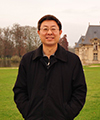
Ma Hui Director General, International Department, Central Committee of the Communist Party of China (IDCPCCC)
Director General Ma Hui has responsibilities for North American, Oceania, United Kingdom and Nordic affairs in the International Department, Central Committee of the Communist Party of China (IDCPCCC). The IDCPCCC looks after the Communist Party’s relations with foreign political parties.
Director General Ma Hui was previously Deputy Division Director for North American affairs and the Deputy Director for South Asian affairs. He was First Secretary (Political) in the Chinese Embassy to the United Kingdom between 1999 and 2001.
Director General Ma Hui holds a Master of Science in Public Policy from University College London with a dissertation on policy making in the British Labour Party. He received his first degree from Beijing International Studies University majoring in British and American Literature.
His research interests include US politics and foreign policy, British and Nordic politics as well as public policy making. He is the co-author of a book on South Asian politics and several papers on US and British foreign policy.
Director General Ma Hui is married with a son.

Dominic Meagher Economist consulting with Fung Global Institute
Dominic is an economist consulting with Fung Global Institute, the treasurer and board member of the Public Interest Law and Advocacy Society (PILAS), a member of the ACYPI Policy Committee and Young China Watchers (Hong Kong) executive committee and is the ALP Abroad contact in Hong Kong. He was formerly research director and senior policy analyst at China Policy, executive director of the Australia-China Youth Dialogue and a 2011 ACYD delegate.
Dominic completed his PhD (economics) at the Australian National University where he was Rio Tinto China Scholar, examining the impact of economic structural changes on energy use, holds a Graduate Diploma and Masters Degree in international development economics from the ANU and an Honours degree in politics and international relations with a major in history from UNSW. Dominic managed the China Economy Program at the Crawford School of Public Policy for three years, was a project officer at the East Asian Bureau of Economic Research and received the Vice Chancellor's Award for Innovation and Excellence for helping establish the East Asia Forum in 2008, where he remained as consulting editor until 2012. He failed to complete a certificate in Chinese language at BLCU because the university closed in response to SARS.
Dominic's research spans international monetary systems, poverty alleviation, sustainable development, climate change, institutional economics, law and economics, Chinese politics, Australia-China and US-China relations, geopolitics, international trade, and ethics.

Simon Monterola Defence Attaché, Australian Embassy Beijing
and has held a diverse range of planning, operational, command and staff appointments, predominantly in the intelligence field. His early postings included 1st Commando Regiment, 1st Intelligence Battalion, and an exchange posting to the US from 1999-2000. He has deployed on operations in Afghanistan (2001-2002) and Solomon Islands (2003), and again deployed to the Middle East region in 2009. More recently, he has had postings to Army Headquarters and Headquarters Joint Operations Command, both in Canberra.
Simon has studied Chinese and Japanese at the ADF’s School of Languages and at the US Foreign Service Institute in Yokohama, Japan. He is a graduate of the Australian Command and Staff Course (2005), where he also completed a Master of Management in Defence Studies, and he completed a Graduate Diploma in East Asian Studies at the Australian National University in 2001.
Simon commenced his current three-year posting as Defence Attaché at the Australian Embassy, Beijing, in January 2014. He is married and has two young daughters, Isabella and Sofia.

Clare Pearson Corporate Social Responsibility Manager, DLA Piper
Clare Pearson is the Corporate Social Responsibility Manager of international law firm DLA Piper in Asia (Bangkok, Singapore, HK, Shanghai, Tokyo, Beijing). A UK qualified lawyer, her role involves advising clients on issues relating to corporate governance, supply chain management, environmental degradation and community/government relations. She provides a combination of legal advice and recommendations as to best practice in each field. Further responsibilities include establishing partnerships with Government charities in China, sitting on clients’ ethics committees in Beijing and assisting with the international integration of DLA Piper’s Asia offices.

Jane Perlez Chief diplomatic correspondent for The New York Times
Jane Perlez is the chief diplomatic correspondent in the Beijing bureau of The New York Times. She covers China and its foreign policy, particularly relations between the United States and China, and their impact on the Asian region.
Before arriving in Beijing in February 2012, Ms. Perlez was the paper’s bureau chief in Pakistan, where for four years she wrote about the fight against al Qaeda and the Taliban, and the troubled alliance between the United States and Pakistan.
For her coverage in Pakistan, Ms. Perlez won the Pulitzer Prize for international reporting in 2009 as part of a team of Times correspondents.
Ms. Perlez has served as a foreign correspondent for The Times since 1988. Her first posting was in East Africa, and in 1993 she was a finalist for the Pulitzer Prize for being the first to report on the famine that ravaged Somalia in 1992.
In the mid-1990s, Ms. Perlez covered central Europe from a base in Warsaw, writing about the attacks by the Serbs on Kosovo. In 1999, she moved to Washington to become the chief diplomatic correspondent writing about American foreign policy.
After Sept. 11, 2001, Ms. Perlez became the paper’s bureau chief in Jakarta, Indonesia.
She was among the first to write about the increasing influence of China in Southeast Asia, and in 2006 won the Overseas Press Club Award for environmental reporting for a series on gold mining and its impact on the environment in underdeveloped countries.

Alexandra Phelan Adjunct Professor in Public Health Law and Ethics at Georgetown University
Alexandra Phelan is an Adjunct Professor in Public Health Law and Ethics, Doctor of Juridical Science (SJD) candidate and General Sir John Monash Scholar at Georgetown University in Washington DC.
Professor Phelan's doctoral research is in the arena of global health and human rights law, with a focus on Australian, Chinese and US laws relating to the human rights and health of vulnerable population groups. In particular, Professor Phelan's doctoral research explores the key legal issues of infectious diseases in the face of pressing global health issues such as climate change, pandemics and refugee mobility.
Professor Phelan completed her Master of Laws (with Merit) at the Australian National University (Canberra, Australia) specializing in international health, human rights and security law. Professor Phelan completed her Bachelor of Biomedical Science/Bachelor of Laws (with Honours) double degree at Monash University (Melbourne, Australia), specializing in international law and health human rights in her legal studies, and infectious diseases in her biomedical science studies. She also holds a Diploma of Languages in Mandarin Chinese from Monash University.
Before commencing her doctoral studies, Professor Phelan was a solicitor at King & Wood Mallesons, where she worked in the climate change law and China groups, and was an active member of the human rights and pro bono law groups. In 2012, Professor Phelan lived and worked in Geneva, Switzerland at the World Health Organization in the Gender, Equity and Human Rights team, and as legal consultant at the GAVI Alliance (the Global Alliance for Vaccines and Immunizations). Professor Phelan is an Honorary Associate at the Castan Centre for Human Rights Law at Monash University, and has guest lectured at the University of Melbourne Law School and the Georgetown University Law Center and School of Medicine.
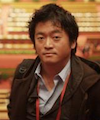
Philip Wen China correspondent for The Age and The Sydney Morning Herald
Based in Beijing, Phillip is the China correspondent for Fairfax Media broadsheets The Sydney Morning Herald and The Age.
Fluent in Mandarin, Philip holds a Bachelor of Commerce from the University of Melbourne and a Graduate Diploma in Journalism from the University of Technology, Sydney.
He was a chartered accountant with consulting firm KPMG before deciding to pursue a career in journalism.

Shi Yan Executive director of Shared Harvest (Beijing) Ecological Agriculture Service Ltd
Shi Yan, the executive director of Shared Harvest (Beijing) Ecological Agriculture Service Ltd, received her PhD from the Renmin University School of Agricultural Economics and Rural Development, and is currently a postdoctoral fellow at Tsinghua University’s School of Social Sciences. As a young PhD student at Renmin University, she founded China’s the very beginning CSA Farm in China, growing and distributing organic vegetables to city consumers and renting plots of land to city folk interested in getting their hands dirty. Since then, 200-300 similar CSA farms have opened across the country. She has since moved on to establish Shared Harvest in Tongzhou and Shunyi in 2012. She has been inspiring a healthier and more sustainable way to feed ourselves. She is a pioneering force and active promoter behind the Chinese organic community-supported agriculture (CSA) movement. She is now the vice president of International CSA Network(URGENCI), She has also published one book”My Alternative Farming Experience in America” and Chinese translations of three related books:Farmers of Forty Centuries: Organic Farming in China, Korea, and Japan; Sharing the Harvest: A Citizen’s Guide to Community Supported Agriculture; and Slow Money.
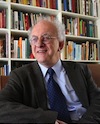
David Walker Alfred Deakin Professor of Australian Studies at Deakin University and BHP Billiton Chair of Australian Studies at Peking University
David Walker researches Australian representations of Asia from the mid-nineteenth century to the present. His book, Anxious Nation: Australia and the Rise of Asia, 1850 to 1939 won the Ernest Scott prize for History in 2001. Anxious Nation has been translated into Chinese and published by China Renmin University Press, Beijing, in 2009. An Indian edition was published in the same year. His book Not Dark Yet, (Giramondo publishing, 2011) examines sight, memory, family and history and has been translated into Chinese by Li Yao and published by the People's Literature Publishing House, Beijing. He has also edited with Agnieszka Sobocinska, Australia's Asia: From Yellow Peril to Asian Century, (UWA Publishing 2012). Professor Walker is a Fellow of the Academy of the Social Sciences in Australia and the Australian Academy of the Humanities. He has extensive experience in the development of Australian Studies programs in P.R. China, India, Japan and Indonesia and held Chairs of Australian Studies at Georgetown University, Washington DC and the University of Copenhagen.

Ann Wang Founder We Impact
Ann has extensive experience working with lifestyle brands in China. She worked with Audi’s Brand Innovation team at Audi Headquarters on their China trend scout trip and advised its innovation research team. She has also worked with BMW, La Prairie, La Mer, Dunhill HOME, and Hermes on various projects, to name just a few. Early in 2011 Ann was selected and trained by Former US Vice president Mr. Al Gore to represent him in China on the Climate Reality program. In 2009, Ann was instrumental in initiating China’s first Youth Delegation to the UN Climate Change Conference in Copenhagen, establishing herself as a prominent environmental leader in China. Currently she is specializing in how luxury lifestyles can integrate CSR and sustainability. Prior to We Impact, Ann headed up the Business Development Department of P1.CN. Previously, she was head of Membership & PR for Quintessentially in China, the world’s leading luxury concierge service group and a highly exclusive members club.

Wang Jiapeng World News Editor at Caixin Media
Wang Jiapeng is World News Editor at Caixin Media, a prominent media group in China offering bi-lingual news products. He is in charge of Caixin’s international news coverage, and also takes a product manager role for Caixin’s experimental news products.
Caixin, led by Editor-in-Chief Hu Shuli, is famous for its investigative coverage on China’s major financial and general news topics, and for its efforts as a news media to shift from print to digital.
Wang has worked in Caixin since its foundation in 2009, first as a magazine reporter, then as multimedia editor and web editor.
Before joining Caixin, Wang worked as a trading manager in Mitsubishi Corporation. He is Master of Journalism from the University of Hong Kong, and Bachelor of Science from Fudan University.

Wang Liwei Vice-Mayor of Guan County, Shandong and Founder and Editor of Charitarian Magazine
Wang Liwei is Vice-Mayor of Guan County, Shandong and Founder and Editor of Charitarian magazine, the first publication on charity in the PRC. Charitarian Group also consults on corporate responsibility and aims to influence, inspire, support and challenge Government agendas in the fields of education, health and human rights.

Wang Tao Resident scholar in the Energy and Climate Program of the Carnegie Endowment for International Peace
Dr Wang Tao is a resident scholar in the Energy and Climate Program of the Carnegie Endowment for International Peace. Based at the Carnegie–Tsinghua Center for Global Policy in Beijing, Dr Wang researches China’s climate and energy policy, including domestic energy developments and the international climate negotiations. Dr Wang was previously program manager at World Wildlife Fund China and a core researcher at the Tyndall Centre for Climate Change Research and the Science and Technology Policy Research Department at the University of Sussex. Dr Wang holds a PhD in Environmental Economics from the University of York and a BA in Environmental Science from Fudan University.

Wang Zhaohui Producer
Raised in Beijing, in 1987, Zhaohui Wang enrolled at China Central Academy of Drama, majoring theatre directing. In 1989, she moved to Australia where she earned a BA Honours in Drama at La Trobe University, and then returned to China to work extensively in television, theatre and film from 1998. She worked as a production Manager and director for several programs for various China Central Television Channels (CCTV), such as “The World Sports” of CCTV Sports Channel, “World Film Reports” CCTV Movie Channel and “Business TV” of CCTV Business Channel. These experiences allowed her travel extensively around world.
From 2005, she joined Beijing Rosat Film and Television Company works as film producer in charging international co-productions. This position allows her to work extensively with filmmakers from UK, Europe, Australia, North America and South America. Projects include: John Rabe (2008), a feature film co-produced between Germany, France and China; Destiny (2007), a feature film co-produced between China and Brasil, Mission Impossible 3 (preproduction, 2005). From 2010, she started working as the head of the development of the company. While working in film and TV, she has maintained her interest and passion for theatre through her extensive contacts in the UK, Australia, the US and Europe.
In 2006 she co-produced the production of Playboy of the Western World – a collaboration between the Oriental Pioneer Theatre in Beijing, and Pan Pan Theatre in Dublin. The production was so successful that the Culture Ireland took it to Dublin. In 2007 she co-produced the Festival of Australian Theatre with Nancy Black and Tania Leong. In 2009, she co-found Square Moon Culture Ltd. with Sun Yue and Gao Yiguang. Fight the Landlord (2010) is the first stage production of the company, and is second collaboration with Pan Pan theatre Ireland. This production has toured to Shanghai, Beijing, Chengdu, and will tour to Taipei and five cities in Australia.

Chloe Xu Kryptoner at 36Kr
Chloe is a Kryptoner at 36Kr, where she spends her time filtering through social media and apps and writing about them. Her work and life resolves around trying new apps, talking to their founders and sharing the informations with 36kr's readers, thereby boosting a dynamic conversation.
36Kr is a start-up devoted to scouting for start-ups that have potential to disrupt the current industry landscape, improve people's lives or just make them happy!

Zha Daojiong Professor of the school of International Studies at Peking University
Zha Daojiong is a Professor of the school of International Studies at Peking University (PKU), where he specializes in Chinese investment strategy as well as energy, food, and water issues. He is currently collaborating with a team of academic, industry and government regulatory specialists on case studies of political risk management for Chinese corporations investing in both developing and developed economies. The book is due to be published by the Peking University Press in August 2014.
Previously, he was Professor of International Relations and Chair of the Department of International Political Economy in the School of International Studies, Renmin University of China (2003-2007).
He holds a Ph.D. in Political Science from the University of Hawaii and the East-West Center and has experience teaching and researching in Macao, Japan, Hong Kong, the United States, and Singapore. From January through March 2013, he was the inaugural Lowy Institute-Rio Tinto China Fellow, based in Sydney, where he focused on studying Chinese direct investment in Australia’s resource sectors.
He is editor of Managing Regional Energy Vulnerabilities in East Asia (Routledge, 2013), first author of Building a Neighbourly Community: post-cold war China, Japan, and Southeast Asia (Manchester University Press, 2006), author of The International Political Economy of China’s Oil Security (in Chinese, 2005), editor of China’s International Relations in the 21st Century: dynamics of paradigm change (University Press of America, 2000).

Zhu Xiaoyang Professor of Anthropology and Deputy Chair of the Department of Sociology, Peking University
Zhu Xiaoyang is Professor of Anthropology and Deputy Chair of the Department of Sociology, Peking University. His research interests include political and legal anthropology and urbanisation in contemporary China. His documentary films, based on his fieldwork in an 'urban village' in Kunming, Yunnan Province, have received international acclaim. Professor Zhu holds a graduate diploma in sociology from the Australian National University and a PhD in anthropology from Macquarie University. He has previously worked as a journalist and filmmaker, and has also published a volume of poetry.

Manuela Zoninsein Founder of Smart Agriculture Analytics
Manuela Zoninsein is a Beijing-based Brazilian-American agriculture media entrepreneur. She is the founder of Smart Agriculture Analytics (SAA), a business intelligence service that helps suppliers and investors of best-in-class agricultural technologies navigate the US$1Trillion market in China. Manuela first developed a passion for agriculture while working on the trading floor of the Chicago Board of Trade at age 18.
Prior to launching SAA’s media monitoring product in 2012, Manuela was both an environment correspondent and a food writer, reporting for the Engineering News-Record (2007-2012) and ClimateWire (2009-2010) as well as serving as dining editor for Time Out Beijing (2008-2009). She came to Beijing on a Princeton-in-Asia Fellowship (2007) and began reporting for Newsweek's Beijing bureau leading up to and covering the Olympics (2007-2009). She subsequently launched www.takeyourownpath.com in Mandarin for Dell from Taipei (2009) and oversaw the launch of the “China Dream” youth campaign for the Joint US-China Collaboration on Clean Energy (JUCCCE) (2011-2012).
She has an MSc in Modern Chinese Studies from Oxford University (2011) focused on Chinese agricultural policy, and a BA in Social Studies and in Latin American Studies from Harvard University (2005). She studied Mandarin at IUP/Tsinghua University on a Blakemore Fellowship (2012-2013) and at ICLP/Taiwan National University on a Huayu Scholarship (2009). She also speaks fluent Portuguese and Spanish and writes a monthly Chinese sustainable food blog for Zester.com.
Video address

Jerome A. Cohen Senior American expert of East Asian Law at New York University School of Law
Professor Jerome Cohen is the senior American expert on East Asian law in New York University School of Law, a senior fellow for Asia Studies at the Council on Foreign Relations, and serves as "of counsel" at the international law firm Paul, Weiss, Rifkind, Wharton & Garrison LLP. As Director of East Asian Legal Studies at Harvard Law School from 1964-1979, he helped pioneer the introduction of East Asian legal systems and perspectives into American legal curricula.
Each year at NYU Law Cohen teaches a course on Chinese law and society. He also offers courses on comparative international law, analyzing how countries with a Confucian tradition relate to the international laws and traditions of the "Christian West." In another course, he explores international business contracts and economic cooperation with East Asia.
The U.S.-Asia Law Institute, which he co-leads, conducts research on contemporary legal developments in China and Taiwan, organizes conferences and exchanges with experts from both sides of the Taiwan Strait, and participates in training programs for Chinese legal specialists in the United States and China. Cohen, who formerly served as C.V. Starr Senior Fellow and director of Asian Studies at the Council on Foreign Relations, remains adjunct senior fellow there and is responsible for the Winston Lord Round Table on US Foreign Policy and the Rule of Law in Asia.

The Hon. Warwick L. Smith AM LLB Chairman NSW and ACT of ANZ, Chairman of the Australia-China Council
Warwick Smith is Chairman New South Wales & Australian Capital Territory and Senior Managing Director of the Australia New Zealand Banking Group Limited (ANZ Bank); Board Director of ANZ Bank China, Chairman of the Advisory Board of Australian Capital Equity, holders of interests in Seven Group Holdings, West Australian News, Coates Hire, WesTrac and Caterpillar industrial services and equipment in Western Australia, New South Wales and North East China; Chairman of the Australia–China Council, Global Trustee of the Asia Society and Chairman of the Asia Society in Australia; Chairman New South Wales Export, Investment & Advisory Board and Chairman of the Flagship Property Group. Formerly, he was Chairman of E*TRADE, the Australian Sports Commission and an Executive Director with Macquarie Bank; and a Federal Government Minister with a parliamentary career spanning 15 years. He was also Australia’s first Telecommunications Ombudsman and has received a Centenary Medal and an Order of Australia.
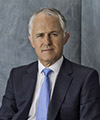
Malcolm Turnbull MP Minister for Communications and Broadband
Malcolm Turnbull is a Liberal member of the House of Representatives and is currently Minister for Communications and Broadband. He was Leader of the Opposition from 16 September 2008 to 1 December 2009 and prior to that Shadow Treasurer.
Elected to Federal Parliament as the Member for Wentworth in 2004, Malcolm was appointed Parliamentary Secretary to the Prime Minister with responsibility for national water policy, and in 2007 appointed to Cabinet as the Minister for Environment and Water Resources.
Malcolm graduated from Sydney University with degrees in Arts and Law. He was a Rhodes scholar and completed a further law degree at Oxford. Malcolm worked as a journalist both in Australia and the United Kingdom before he began legal practice in 1980. He successfully defended the former MI5 agent Peter Wright in his efforts to publish his memoirs, Spycatcher.
In 1987 Malcolm established his own investment banking firm and during that time co-founded a number of Australian companies including OzEmail Ltd —Australia first large Internet service provider. He joined Goldman Sachs & Co in 1997 as Chairman of its Australian business, becoming a partner of the global firm in 1998.
Malcolm is married to Lucy and they have two adult children.

Hon. Jeffrey L. Bleich Former U.S Ambassador to Australia and Special Counsel to President Obama
Jeff Bleich is a litigation partner based in the San Francisco office of Munger, Tolles & Olson LLP. He returned to the partnership in December 2013 following four years of service as U.S. Ambassador to Australia and as Special Counsel to President Obama in the White House during the first year of the Administration. His law practice is focused on international and domestic litigation and counseling, with special emphasis on privacy and data security, internal investigations, trade and cross-border disputes, and the Asia-Pacific region.
Mr. Bleich joined Munger Tolles as a litigator in 1992, specializing in complex litigation. He has represented many of America’s leading companies in the technology, security, media, finance and manufacturing sectors, including as lead counsel in both jury and bench trials and in appeals before the U.S. Supreme Court, California Supreme Court and numerous intermediate courts. He has been regularly listed among the Daily Journal's Top 100 attorneys in California, honored as a California Lawyer Attorney of the Year, and listed in Lawdragon 500 and in America's Best Lawyers as a top “Bet the Company” lawyer. Mr. Bleich has also taught several courses at UC Berkeley School of Law, and publishes extensively.
Mr. Bleich previously served as Special Counsel to President Obama from March-September 2009 before being appointed by the President to serve as the 24th United States Ambassador to Australia. As Ambassador, Mr. Bleich’s term was marked by the U.S. rebalance to the Asia-Pacific, with Australia being the focal point for that shift. His efforts included overseeing record growth in trade and investment between the U.S. and Australia, bringing the Defense Trade Cooperation Treaty into force, establishing new alliance agreements for satellites and cyber security, executing a new space cooperation agreement that supported the Mars Curiosity rover landing, leading joint U.S.-Australia efforts in Afghanistan’s Uruzgan province, and promoting regional human rights efforts. For his federal service, Mr. Bleich has received numerous awards, including the highest civilian honor awarded by the Director of National Intelligence: the Distinguished Service Medal. In 2013, he received the State Department's highest award for a non-career ambassador, the Sue Cobb Prize for Exemplary Diplomatic Service.
In addition to his professional practice and federal service, Mr. Bleich has served the State of California overseeing the nation’s largest higher education system as Chair of the California State University Board of Trustees (2008-09), and the nation’s largest bar association, as President of the California State Bar (2007-08). Mr. Bleich has also served as President of the Bar Association of San Francisco (2002-2003) and Chair of the ABA’s Amicus Curiae Committee (2008-09), as well as chair or president of several other non-profit legal organizations. From 1998-1999, he served as Director of the White House Commission on Youth Violence following the tragic Columbine shootings.
Prior to joining Munger Tolles, Mr. Bleich clerked for Chief Justice William H. Rehnquist of the U.S. Supreme Court, Judge Abner J. Mikva of the U.S. Court of Appeals for the D.C. Circuit and Judge Howard M. Holtzmann of the Iran-U.S. Claims Tribunal at The Hague.
Mr. Bleich holds a B.A. magna cum laude from Amherst College, an M.P.P from Harvard University with highest honors, a J.D. from the UC Berkeley School of Law with highest honors, and an honorary Doctor of Laws from S.F. State University. He was Editor-in-Chief of the California Law Review, Order of the Coif, and received the Thelen-Marrin Prize for outstanding scholarship.
Mr. Bleich has been elected as a life member to both the American Law Institute and the Council on Foreign Relations. He also serves on the board of Pratt Industries as well as Willie May’s Say Hey Foundation. In 2009, the City of San Francisco named a day in his honor.
China opportunities put UNSW ahead of Sydney's elite institutions
Despite Sydney being named the most popular city in the world for international university students this week, experts here have questioned Australia's capacity to provide a 360-degree learning experience for Chinese students, with UNSW singled out as the lead university striking new ground on becoming a truly "China Ready" institution.
Why Australian businesses should go west in China
by Stephen Minas
Recent international travellers may have spotted a large panda dressed in what appears to be a spacesuit peering down at them in their airport terminal, its chest festooned with Chinese and international corporate logos.
‘Half of the Fortune Global 500 are in my hometown’, proclaims the panda. It’s an advertisement for Chengdu, the ancient capital at the heart of western China’s growth story.
The unsubtle message is that its economy has taken off. Western and central China's economic growth rates overtook the eastern provinces in 2005, off a lower base. These inland regions are increasingly on the radar as Australia continues to build ties with China.
Western China's economic emergence follows a succession of sometimes-tumultuous development drives.
In the 1950s, the Communist Youth League sent 'youth volunteer land reclamation teams' to the Qinghai highlands to ‘convert empty lands into good fields’.
In the mid-1960s, amid heightened Sino-Soviet tensions and increasing US involvement in Vietnam, Mao Zedong relocated industrial production, including whole factories, from coastal areas -- vulnerable to attack by the two superpowers -- to China's west.
A large proportion of China's investment until the early seventies was poured into this 'third front', which reached from Gansu in the north down to Yunnan in an attempt to create a 'secure rear base area'.
Subsequently, reform leader Deng Xiaoping’s developmental strategy was explicitly focused on coastal areas. During the eighties and nineties, the coastal region's share of state investment, FDI and GDP grew at the expense of the central and western regions.
In 1996, Jiang Zemin introduced a policy of 'gradually reducing the gap in development between regions'. Chongqing was named a province-level municipality -- equivalent to Beijing and Shanghai -- the following year.
In 2000 the 'great western development' strategy was launched. Policies to boost western development have included fiscal transfers, investment in infrastructure and tax and loan advantages. Rising labour and land costs along China's coast have also prompted businesses to relocate inland.
Beijing's push to build economic ties with Central Asia has been a feature of the 'Go West' effort. China's premier speaks of 'establishing a Silk Road economic belt'.
Events in Urumqi and Kashgar attract traders from across the region. Major pipelines carry oil and gas from Kazakhstan, Turkmenistan and Uzbekistan to China, which has invested heavily in Central Asia's resource sector.
In 2010, Chinese companies controlled 23 percent of Kazakhstan's oil output. Increasing economic links between Central Asia and western China are part of a broader trend, with the proportion of Central Asia's trade that takes place with the rest of Asia increasing from 16.3 percent in 2000 to 35.8 percent in 2012.
Economic growth in China's west brought with it calls for increased Australian engagement. A 2009 Lowy Institute report, 'Australia's Diplomatic Deficit', identified a mismatch between Australia's 'growing economic and consular interests' in inland China and the concentration of Australia's diplomats along China's coast. The report recommended new diplomatic missions in Chengdu and Chongqing.
Governments are increasingly moving to support Australian businesses and organisations in western China. In 2012 the Victorian government led by Ted Baillieu (for which I worked at the time) led what was then Australia's largest ever trade mission to China.
During that mission, the government announced that it would open a government business office in Chengdu and that Sichuan Airlines would commence direct flights between Chengdu and Melbourne. Victoria also signed a trade and investment MoU with the government of Sichuan province (population: 80 million).
In 2013, the Rudd Government opened a new consulate general in Chengdu, extending Australia's western China presence beyond Austrade's Chengdu and Kunming offices. During the Abbott Government's recent trade mission to China (which included industry events in Chengdu), the government secured an agreement to establish the Australia-Sichuan Trade and Investment Roundtable.
This proactive approach to the region by government is especially important because Australian businesses in western China will often be operating in less developed locations than the more familiar coastal cities, while contending with variable business conditions.
'China 2030', a joint report of the World Bank and China's State Council, found that productivity in western China was less than half the level of the eastern regions. The Economist Intelligence Unit forecasts that urbanisation rates in Yunnan, Tibet and Guizhou will continue to lag behind comparatively wealthy coastal provinces.
However, western China's catch-up development also presents opportunities for Australian businesses. ‘China 2030’ identifies 'green development' as a strategy for western China to catch up with coastal provinces without continuing the environmentally disastrous 'clean up later' approach. Australian firms have considerable expertise in fields such as energy efficiency and sustainable urban design with, for example, Melbourne-based architects recently winning a major Chengdu commission ahead of Chinese and international competitors.
The impetus for Australia's deeper engagement with western China goes beyond economics. It’s also about building people-to-people links. Additionally, Western China is a window on how China's leaders see their place in the world.
Much of China's interaction with Central Asia is driven by national security and resource security considerations, including through the Shanghai Cooperation Organization. The growing Australian interaction with western China is likely to bring additional insights into China's foreign relations.
Classical Chinese literature records that the original 'Journey to the West', though far from straightforward, was ultimately worthwhile. As Australia works to strengthen ties in Asia, growing engagement with western China is similarly an effort worth making.
Stephen Minas is a research associate with the Foreign Policy Centre, London.
Retrieved from businessspectator.com.au
(http://www.businessspectator.com.au/article/2014/5/8/china/why-australian-businesses-should-go-west-china)


